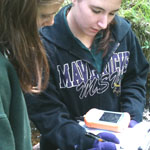 Three Central Lakes College Natural Resources students and an
Three Central Lakes College Natural Resources students and aninstructor have completed water quality assessments for Camp Ripley Military
Training Center. The 2011
monitoring report was prepared for the Department of Military Affairs by
Michelle Dickson, Pine River; Blake Quick, Hackensack; and Brian Steffen,
Little Falls. Instructor Kent Montgomery, who is working to develop a freshwater
studies emphasis in the CLC Natural Resources program, helped direct the
activity.
Dickson is a 2009 graduate of Pine River High School and a
2012 honor graduate at CLC, where she earned her Associate in Applied Science
degree.
2012 honor graduate at CLC, where she earned her Associate in Applied Science
degree.
Quick is a
2005 graduate of Walker-Hackensack-Akeley High School. He also graduated from
CLC with an AAS degree this spring.
2005 graduate of Walker-Hackensack-Akeley High School. He also graduated from
CLC with an AAS degree this spring.
Steffen is
a 2009 graduate of Pierz Healy High School who was named to the fall 2011
Dean’s List at CLC.
a 2009 graduate of Pierz Healy High School who was named to the fall 2011
Dean’s List at CLC.
Students
worked as summer interns at Camp Ripley, where
Mark Erickson, environmental programs administrator, and Marty Skoglund, environmental
program director, initiated the program and oversaw it last summer.
worked as summer interns at Camp Ripley, where
Mark Erickson, environmental programs administrator, and Marty Skoglund, environmental
program director, initiated the program and oversaw it last summer.
The team monitored three streams,
sampling them six times at 30-day intervals from June to December 2011. Data
was added to that which had been collected by the University of
Minnesota-Duluth and St. Cloud State University.
sampling them six times at 30-day intervals from June to December 2011. Data
was added to that which had been collected by the University of
Minnesota-Duluth and St. Cloud State University.
Samples
were analyzed for phosphorous, nitrogen, suspended solids, and chlorophyll.
They took temperature readings and measurements for dissolved oxygen, pH,
conductivity, turbidity, and total dissolved solids.
were analyzed for phosphorous, nitrogen, suspended solids, and chlorophyll.
They took temperature readings and measurements for dissolved oxygen, pH,
conductivity, turbidity, and total dissolved solids.
Fish and
invertebrate community samples were analyzed as well as measures of physical
habitat.
invertebrate community samples were analyzed as well as measures of physical
habitat.
Measures of water
quality generally fell within expected limits for streams within the Upper
Mississippi River Basin.
quality generally fell within expected limits for streams within the Upper
Mississippi River Basin.
Fish species found
included sucker, chub, redbelly, fathead and brassy minnow, northern pike,
mudminnow, brook trout, sculpin, and Iowa darter.
included sucker, chub, redbelly, fathead and brassy minnow, northern pike,
mudminnow, brook trout, sculpin, and Iowa darter.
The report concluded “The
streams sampled at Camp Ripley are limited in size and flow, and not
surprisingly did not support populations of large fish. They did, however,
display moderate measures of diversity, with functional groups such as
predators and small benthic foragers represented.”
streams sampled at Camp Ripley are limited in size and flow, and not
surprisingly did not support populations of large fish. They did, however,
display moderate measures of diversity, with functional groups such as
predators and small benthic foragers represented.”
Camp Ripley streams
exceed many of the Upper Mississippi River Basin streams in several areas of
water quality, including total phosphorus and dissolved oxygen
concentrations.
exceed many of the Upper Mississippi River Basin streams in several areas of
water quality, including total phosphorus and dissolved oxygen
concentrations.
The researchers advised future monitoring.
“We are currently finalizing this year’s agreement for
another season of work at Camp Ripley and will employ a couple students,”
said instructor Montgomery.
 CLC News The news and events from Central Lakes College
CLC News The news and events from Central Lakes College



